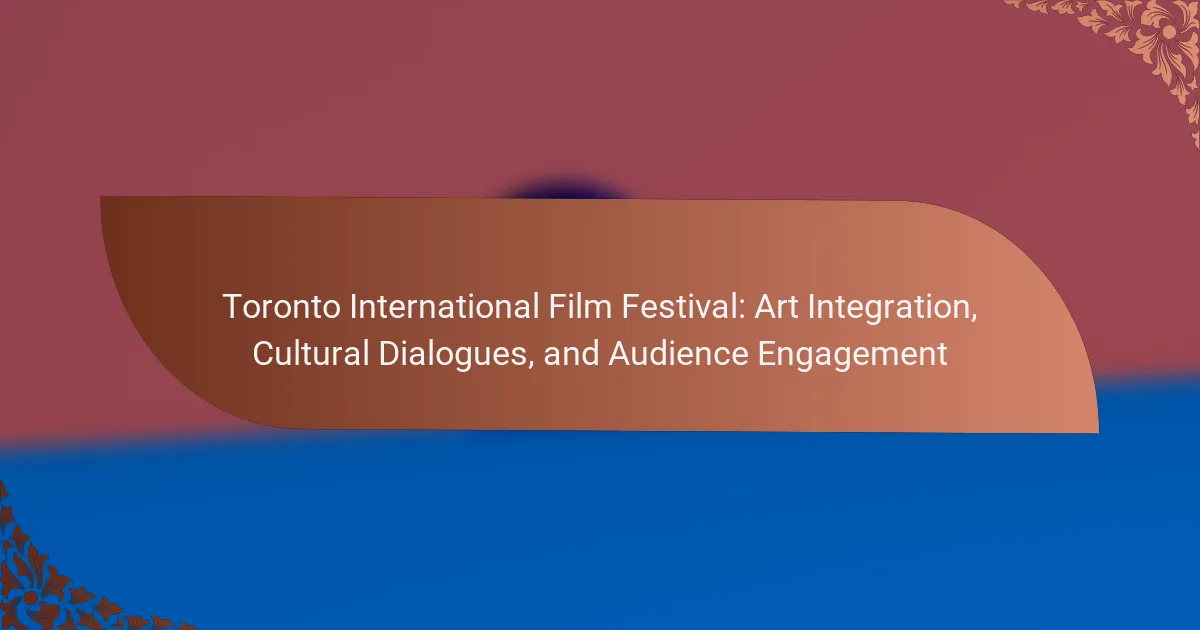The Toronto International Film Festival enhances cultural appreciation through art integration, fostering dialogues between filmmakers and audiences. It showcases diverse narratives and offers interactive events for deeper engagement. The festival adapts to evolving trends by incorporating digital platforms and immersive experiences, ensuring accessibility and community involvement. Challenges like overcrowding and ticket availability are also addressed to improve attendee experiences.

What role does art integration play in the Toronto International Film Festival?
Art integration enhances the Toronto International Film Festival by fostering cultural dialogues and enriching audience engagement. Through diverse artistic expressions, the festival creates a platform for filmmakers and artists to collaborate and share unique narratives. This integration attracts a varied audience, promoting inclusivity and cultural appreciation. The festival’s unique attribute lies in its ability to merge film with other art forms, creating immersive experiences that resonate with attendees. As a result, art integration plays a crucial role in shaping the festival’s identity and impact on the cultural landscape.
How are local artists showcased alongside international filmmakers?
Local artists are showcased alongside international filmmakers through curated programs and collaborative projects at the Toronto International Film Festival. These initiatives foster cultural dialogues and enhance audience engagement. The festival features local art installations and performances, creating a vibrant intersection of film and visual arts. This integration highlights the unique contributions of local creators while enriching the overall festival experience for attendees.
What are the benefits of collaborating with visual artists at the festival?
Collaborating with visual artists at the Toronto International Film Festival enhances cultural dialogues and audience engagement. This integration fosters creativity, promotes diverse artistic expressions, and enriches the overall festival experience. Additionally, it creates opportunities for interdisciplinary collaboration, attracting a wider audience and elevating the festival’s cultural significance. Engaging with visual artists also allows filmmakers to explore new narrative dimensions, ultimately enhancing the storytelling aspect of their work.
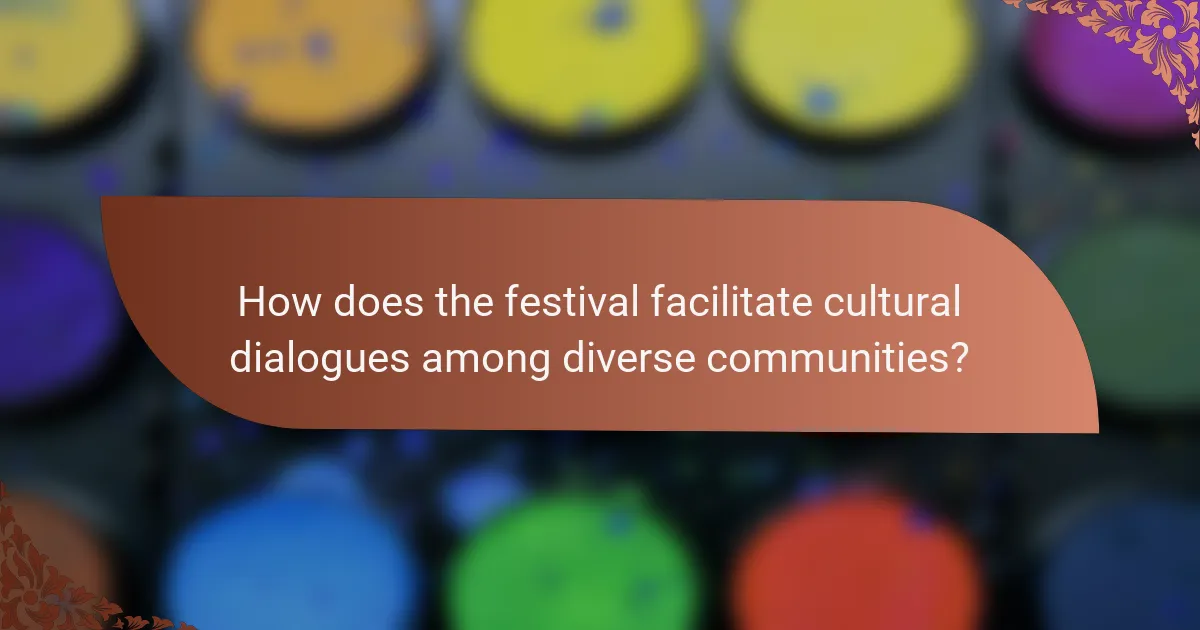
How does the festival facilitate cultural dialogues among diverse communities?
The Toronto International Film Festival fosters cultural dialogues by showcasing diverse narratives and facilitating interactions among filmmakers and audiences. Through curated screenings and panel discussions, it promotes understanding of various cultures. The festival highlights unique storytelling styles, engaging communities and encouraging cross-cultural exchanges. This integration of art and dialogue enriches the cultural fabric of Toronto, making it a vibrant hub for global cinema.
Which themes emerge from the films that promote cross-cultural understanding?
Films at the Toronto International Film Festival often highlight themes that foster cross-cultural understanding. These themes include shared human experiences, cultural diversity, and social justice.
By showcasing narratives from different perspectives, filmmakers encourage audiences to engage with unfamiliar cultures. This engagement promotes empathy and dialogue, allowing viewers to reflect on their own beliefs and values.
The festival emphasizes collaboration among artists from various backgrounds, creating a platform for cultural exchange. Such integration enhances audience awareness of global issues and fosters a sense of community.
Ultimately, the films serve as a catalyst for conversations about identity, belonging, and the complexities of modern society. This dialogue is crucial for building bridges between cultures and promoting mutual respect.
How do panel discussions enhance cultural exchange during the event?
Panel discussions enhance cultural exchange by fostering dialogue among diverse voices. They create a platform for sharing perspectives, experiences, and artistic insights. This interaction promotes understanding and collaboration among participants from various cultural backgrounds. As a result, audiences gain a deeper appreciation for global narratives and artistic expressions showcased at the Toronto International Film Festival.
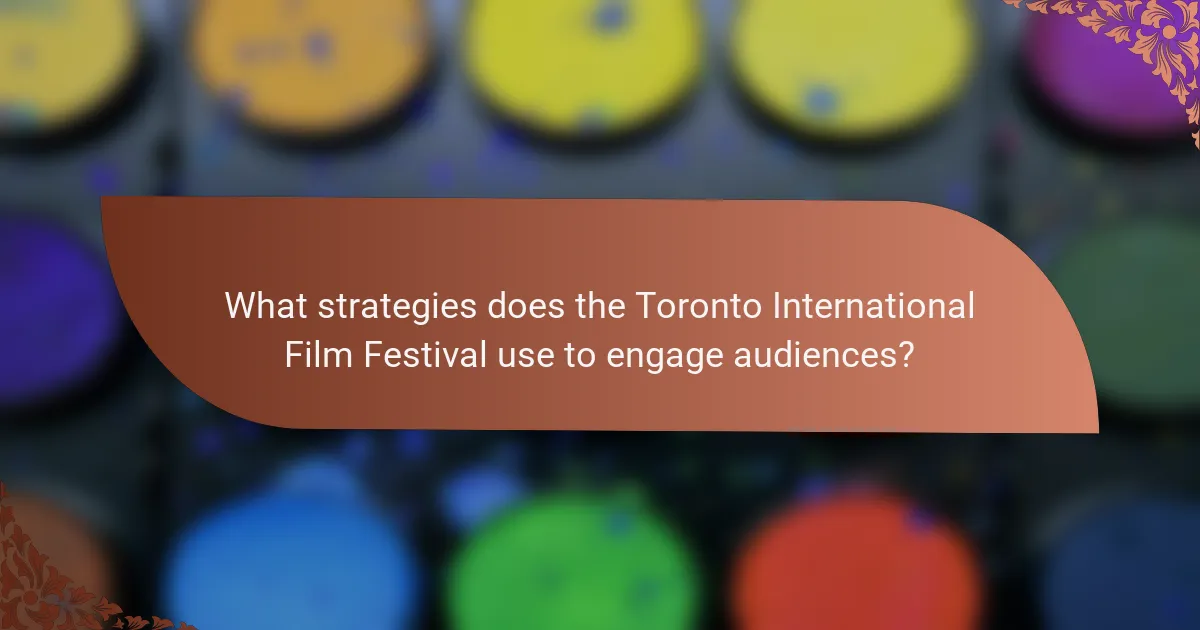
What strategies does the Toronto International Film Festival use to engage audiences?
The Toronto International Film Festival engages audiences through innovative programming, interactive events, and community involvement. It showcases diverse films that spark cultural dialogues and offers opportunities for audience participation.
The festival features Q&A sessions with filmmakers, panel discussions, and workshops that enhance the viewing experience. These initiatives foster deeper connections between audiences and the art of cinema.
Moreover, the festival employs social media campaigns and digital platforms to reach a broader audience. This strategy allows for real-time engagement and encourages conversations around featured films.
Lastly, partnerships with local organizations enhance cultural relevance, creating a unique atmosphere that resonates with attendees. These efforts collectively position the festival as a pivotal cultural event.
How effective are interactive screenings in audience participation?
Interactive screenings significantly enhance audience participation by fostering engagement and dialogue. These events allow viewers to interact with the content and each other, creating a dynamic experience. For instance, the Toronto International Film Festival employs these screenings to integrate art and cultural dialogues, encouraging active participation. As a result, attendees feel more connected to the film and its themes, leading to deeper discussions and reflections. This approach not only enriches the viewing experience but also cultivates a sense of community among diverse audiences.
What role does social media play in audience engagement before and during the festival?
Social media plays a crucial role in audience engagement before and during the Toronto International Film Festival. It fosters real-time interactions, enhances visibility, and creates community around the event.
Before the festival, social media platforms generate excitement through targeted marketing campaigns. Teasers, trailers, and behind-the-scenes content attract potential attendees. User-generated content further amplifies reach, as fans share their enthusiasm.
During the festival, social media facilitates live updates and interactions. Hashtags allow audiences to engage with events and each other, creating a shared experience. Influencers and filmmakers often participate, enhancing visibility and encouraging discussions around films.
The integration of social media into the festival’s strategy exemplifies its unique attribute of enhancing cultural dialogues and audience participation, making it a vital component of the overall experience.
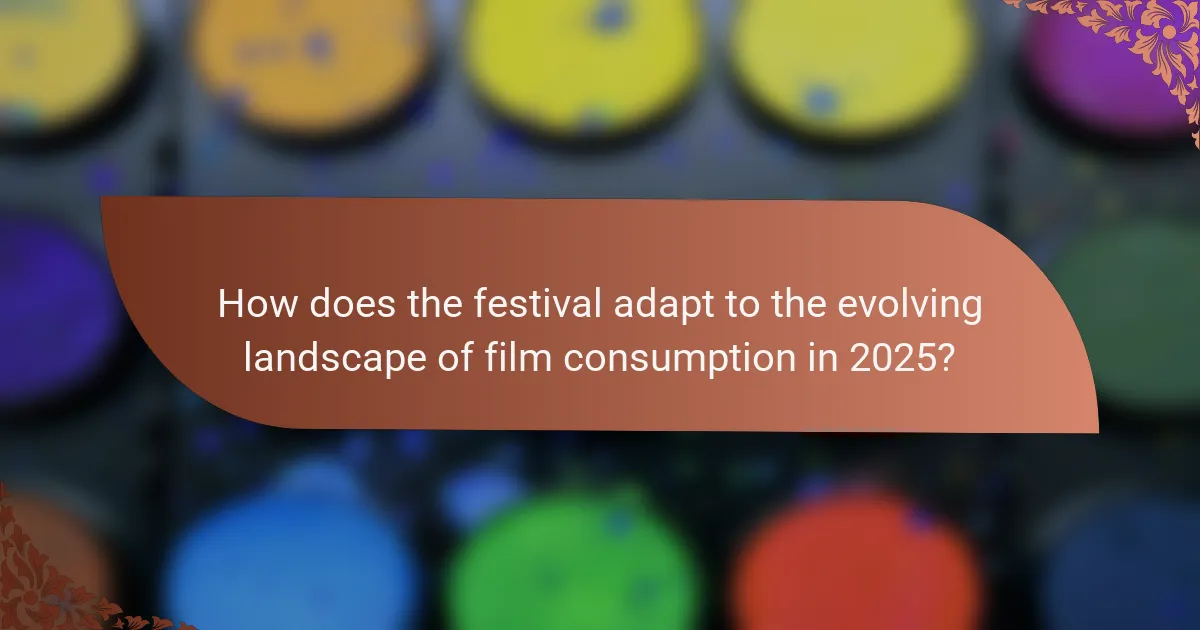
How does the festival adapt to the evolving landscape of film consumption in 2025?
The Toronto International Film Festival adapts by embracing digital platforms and interactive experiences. In 2025, it integrates virtual reality and augmented reality to enhance audience engagement. This approach reflects shifting consumption habits, allowing broader access to diverse films. The festival also emphasizes cultural dialogues through panel discussions and workshops, fostering community connections. As a result, it maintains relevance in an evolving cinematic landscape.
Which emerging technologies are influencing the festival experience?
Emerging technologies significantly enhance the Toronto International Film Festival experience. Virtual reality, augmented reality, and artificial intelligence create immersive environments and personalized content. For example, AR enhances venue interactions, while AI analyzes audience preferences to tailor programming. These technologies foster deeper cultural dialogues and increase audience engagement, making the festival more accessible and dynamic.
What trends in audience behavior are shaping the festival’s programming?
Audience behavior trends are significantly influencing the programming of the Toronto International Film Festival. Increased demand for diverse storytelling reflects a broader cultural dialogue, encouraging the inclusion of underrepresented voices. Additionally, audience engagement through interactive experiences, such as Q&A sessions and panel discussions, enhances the festival’s appeal. The growing interest in digital platforms has prompted the festival to incorporate virtual screenings, reaching a wider audience. These trends drive the festival to adapt its programming, ensuring relevance and resonance with contemporary viewers.
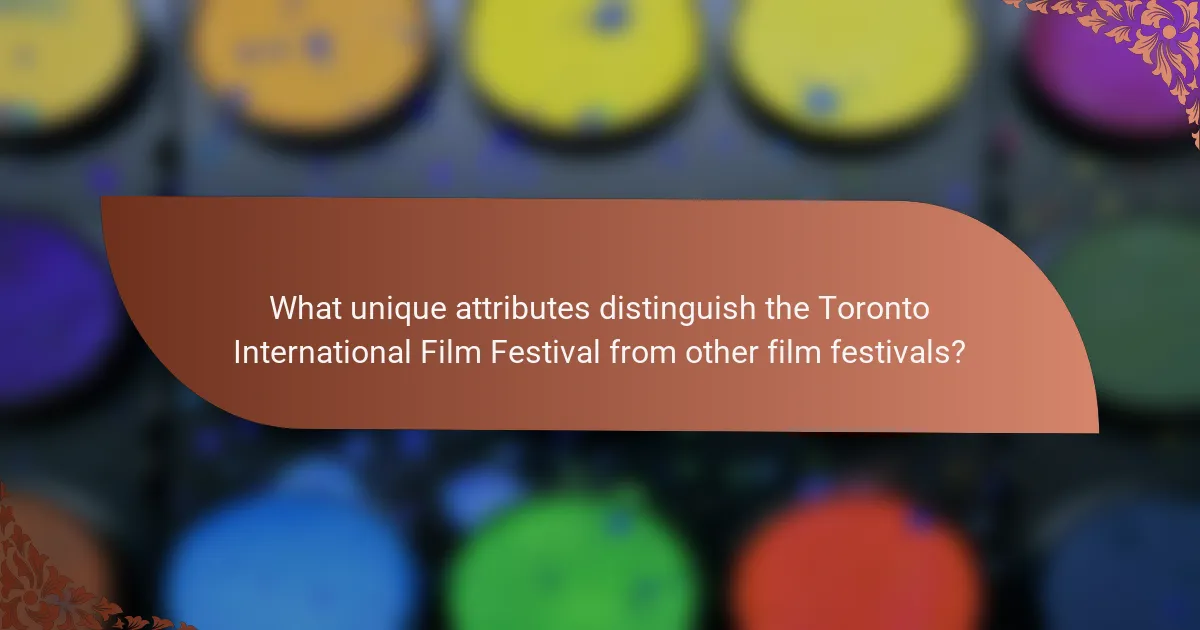
What unique attributes distinguish the Toronto International Film Festival from other film festivals?
The Toronto International Film Festival (TIFF) stands out due to its emphasis on art integration, cultural dialogues, and audience engagement. TIFF uniquely showcases diverse global cinema, fostering discussions that connect filmmakers and audiences. It features a strong focus on Canadian content, highlighting local talent alongside international films. TIFF also prioritizes accessibility, offering various programs to engage different demographics, enhancing community involvement. The festival’s innovative formats, such as immersive experiences and interactive panels, further distinguish it from other film festivals.
How does the festival’s commitment to sustainability manifest in its operations?
The Toronto International Film Festival demonstrates its commitment to sustainability through various eco-friendly operations. These include waste reduction initiatives, sustainable sourcing of materials, and promoting public transportation for attendees. The festival implements a comprehensive recycling program, aiming to divert over 70% of waste from landfills. Additionally, it collaborates with local organizations to support green practices and raises awareness about environmental issues through curated film selections. This multifaceted approach reflects the festival’s dedication to fostering a sustainable cultural dialogue.
What exclusive events set the festival apart in the global film landscape?
The Toronto International Film Festival stands out with its exclusive events that foster artistic collaboration and cultural exchange. Notable events include the Industry Conference, which connects filmmakers with industry professionals, and the Share Her Journey initiative, promoting gender equality in film. The festival also features the Emerging Filmmakers program, showcasing new talent and innovative storytelling. These initiatives enhance audience engagement and position the festival as a leader in cultural dialogues within the global film landscape.

What are the common challenges faced by attendees at the festival?
Attendees at the Toronto International Film Festival commonly face challenges such as overcrowding, ticket availability, and navigating diverse programming. These issues can impact the overall experience and engagement with films and discussions.
Overcrowding often leads to long lines and limited seating, affecting access to popular screenings. Ticket availability can be competitive, making it difficult for fans to secure spots for desired films. Additionally, the festival’s extensive programming can overwhelm attendees, complicating decision-making on which events to prioritize.
Understanding these challenges can enhance planning and improve engagement at the festival.
How can attendees navigate the crowded schedule effectively?
Attendees can navigate the crowded schedule effectively by prioritizing key events and utilizing planning tools. Create a personalized itinerary based on interests, focusing on films, panels, and networking opportunities. Use the festival app for real-time updates and venue maps. Engage with social media for recommendations and connect with fellow attendees to share insights.
What resources are available for first-time visitors to enhance their experience?
First-time visitors to the Toronto International Film Festival can access a variety of resources to enhance their experience. Official websites provide schedules, ticketing information, and event details. Mobile apps offer real-time updates and personalized itineraries. Social media platforms facilitate community engagement and insights. Additionally, workshops and panels foster cultural dialogues and audience engagement. Local guides and forums share tips for navigating the festival effectively.
What best practices can enhance audience engagement at film festivals?
Engaging audiences at the Toronto International Film Festival can be enhanced through interactive experiences, diverse programming, and community involvement. Incorporating art installations related to film themes fosters deeper connections. Hosting panel discussions with filmmakers encourages cultural dialogues, enriching the festival atmosphere. Offering workshops allows attendees to engage creatively, making the experience more memorable. Lastly, leveraging social media for real-time interactions can boost audience participation and excitement.
